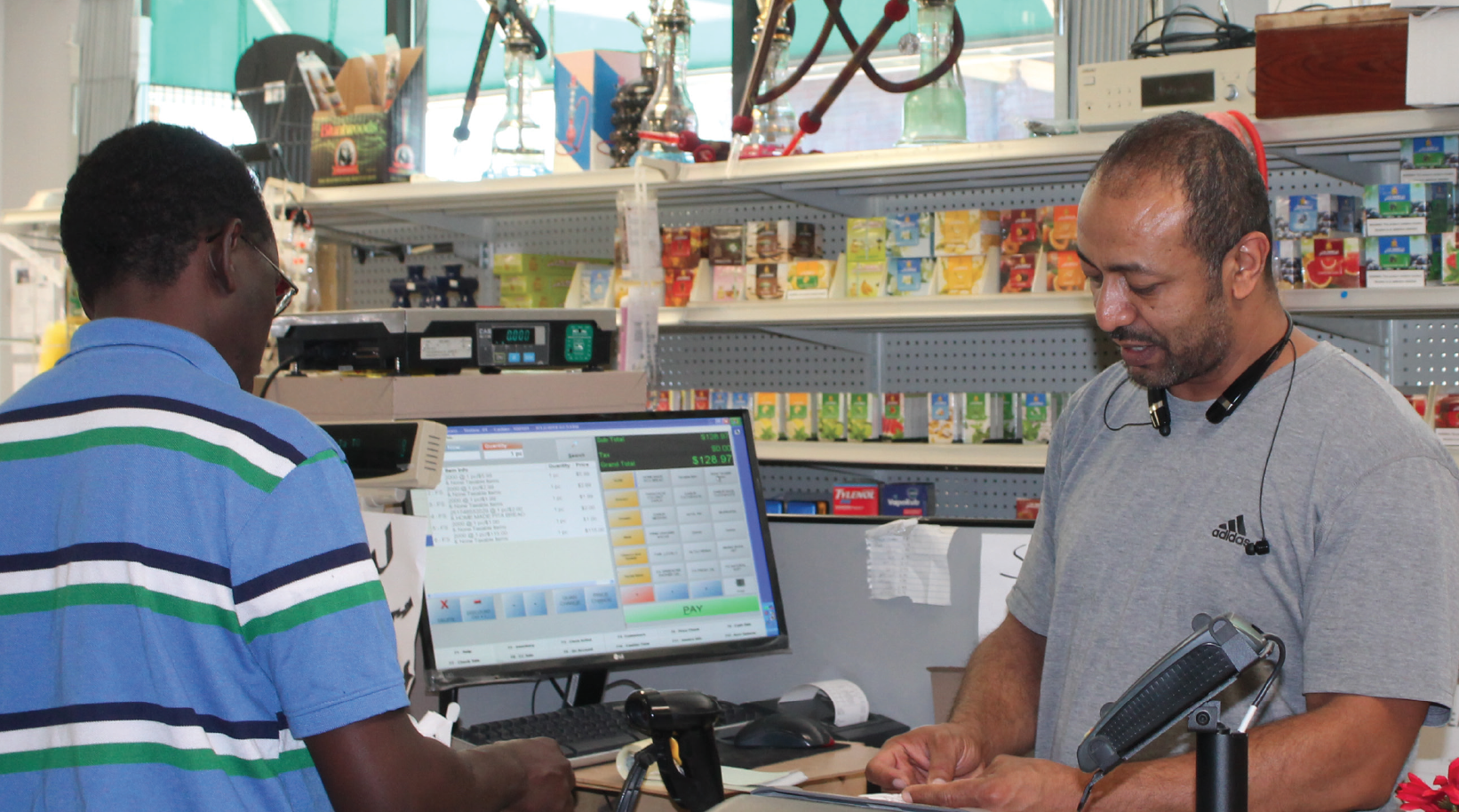
Global Food Mart Owner Tawfig Hagelamin, who has tripled the size of his grocery business over seven years in operation, rings up a customer on a recent afternoon. PHOTO KATHARINE CARLON
By Katharine Carlon
katharine@corridorbusiness.com
It’s been a long and sometimes crooked path from refugee to small business success story for Tawfig Hagelamin.
“We’ve grown, and we’ve grown fast,” said the 38-year-old owner of Coralville’s Global Food Mart, which has expanded twice since opening in 2011, growing from a single bay in a strip mall at 89 Second Ave. to three. “But it has taken a lot of work and a lot of time.”
Visitors to Global Mart will likely notice the smell of fresh pita in the air, the array of exotic spices and unfamiliar food items, and the animated, friendly conversations Mr. Hagelamin and his staff enjoy with each customer. But few will appreciate the complicated journey from newcomer with little knowledge of English to college graduate and thriving businessman.
After escaping forced military conscription in war-torn Sudan, Mr. Hagelamin, then 18, sought refuge first in Egypt and later in the United States, hopscotching from Houston to Phoenix and landing in Iowa City in 2000.
One of only 20 Sudanese residents in Iowa City at that time, he held an eclectic series of jobs – from pizza deliveryman to a two-and-a-half-year stint as an Arabic translator for the U.S. Department of Defense just after the Iraq invasion – before daring to open his own business.
What gave him the courage, he said, was finishing his education – the through line of his life and the advice he gives to other immigrant entrepreneurs. The quest for continuing his studies, as much as the violence in his native country, drove him to Egypt, while the promise of even better educational opportunities motivated him to travel to the United States.
“It took me 11 years to finish college, but education gave me everything,” Mr. Hagelamin said of the long process of getting a degree while struggling to support himself financially. After changing majors several times, including studying computing at Kirkwood and business at the University of Iowa, he graduated with a degree in international studies from UI.
“School is what helped me become successful – to do accounting, inventory, everything,” he added. “School teaches you how to talk and how to get bigger people and bigger companies to talk to you. School is the key.”
Even with a degree, the learning curve of getting a business off the ground was steep. For a time, Mr. Hagelamin vacillated between opening an auto dealership and an international grocery. But while the Iowa City area already had plenty of car lots, there was a gap in the market for international foods, with only one other competitor in the Middle Eastern niche: Al Safa, which has since gone out of business.
Armed with a business plan he believed was strong, Mr. Hagelamin leased a small space in the strip mall and set about stocking his shelves.
“It wasn’t easy at first. I didn’t have much experience,” he recalled. “I had experience with selling and buying, but not with wholesalers and distributors. … They didn’t know me, and to compete in the market, you have to have everything available for customers, which requires a lot of money.”
Mr. Hagelamin struggled to obtain credit allowing him to float purchases for 30 days with wholesalers and distributors. Even with the assistance of UI small business development experts, who helped him revise his business plan, he was unable to get a bank loan. With just $70,000 in capital to start his business, saved from his time as a translator, he was forced to use credit cards to keep shelves stocked and bills covered.
“It took four years to get to my break even,” he said. “It was a little bit scary.”

Today, getting credit is no longer a problem, and Mr. Hagelamin has not looked back, adding a bakery in the store’s fifth year, and later a full kitchen and butchering operation that does everything “except the slaughtering.”
Global Mart offers catering and carry-out featuring specialties such as beef and chicken shawarma, falafel bowls and kabob sandwiches. The store also sells hard-to-find meat products, and grinds its own burgers and sausages, including Sudanese soujouk, an aromatic air-dried sausage.
The bakery produces cookies, baklava and other sweets, and what Mr. Hagelamin called “the best pita bread in Iowa City,” made fresh daily in a stone oven.
“All the Sudanese and Middle Eastern come eat that pita,” he said, conservatively estimating the bakery produces about 150 pounds of dough each day. “And I have 15-20 American customers who come every day for that bread.”
Mr. Hagelamin said he has been asked by restaurants to supply pita, but that will have to wait for a future expansion. First, he is exploring the possibility of opening a second location to serve not only the area’s growing Sudanese population, but customers from a variety of Middle Eastern and Eastern European countries, as well as the Indian and Pakistani communities.
“Iowa gave me a lot,” he said, adding that having lived more than half his life here, the area feels like home. “It was my dream to open a business and be successful and I did it. I’m still doing it and expanding all the time. I don’t want to ever turn my back on the city that gave me everything.”
That means Mr. Hagelamin will continue doing the things he says made the store grow rapidly: hiring the right people, “being different and always improving,” attention to customer service, and lots of hard work.
After working 16-hour days to get Global Mart off the ground for its first four years, he’s slowed down to make time for his wife and two children – but only a little. Mr. Hagelamin still works six days a week, 10 a.m.-9 p.m. Monday through Friday, and 10-4 on Saturdays.
“I do take Sunday off,” he laughed. “It’s what it takes.”




